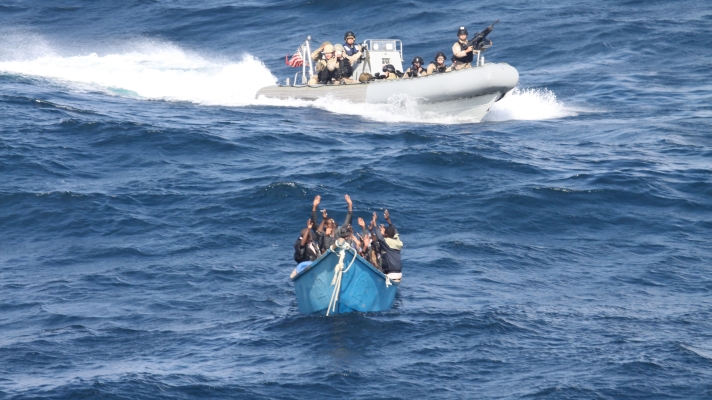On 30 November, the Dutch Senate approved a repair bill for the Merchant Shipping Protection Act. This act allows, under certain conditions, private armed security on sea-going vessels under Dutch flag as of 1 January 2022. The Act specifically targets the Gulf of Aden, so it is not (yet) a solution for current piracy hotspot the Gulf of Guinea.
Nothing stands in the way of entry into force of the Act, provided that this date is actually included in the Act by the Minister of Justice and Security. Despite its limited use in terms of the current piracy hotspots, the Royal Association of Netherlands Shipowners (KVNR) says the maritime sector is delighted that seafarers on Dutch seagoing vessels can now be protected.
‘For over ten years we have been fighting for such legislation, together with the captains’ association NVKK, trade union Nautilus International and the Vereniging Maritiem Gezinskontakt,’ says KVNR managing director Annet Koster. ‘At last we have reached the point where our ships and people can sail safely through dangerous waters, even when Defence cannot deploy protection teams. Moreover, the Netherlands is no longer out of step compared to other European maritime nations.’
The Merchant Shipping Protection Act (Wet ter Bescherming Koopvaardij) may only be used in sailing areas designated by the Dutch Government. At the moment, this concerns the so-called High Risk Area near the Gulf of Aden. An important aspect for shipowners and seafarers is that onboard security acts as a preventive deterrent. Now that Dutch ships are always secured, they are less likely to be attractive targets. If a ship is nevertheless attacked, the necessary professional and certified security is in place to adequately protect the ship and its crew.
Also read: Armed private security for Dutch merchant vessels on the horizon
Supervision and enforcement
As of 1 January 2022, private security companies can be certified by the Dutch Government to provide these services on board ships. After the deployment of a private security team, a report must be submitted to the Human Environment and Transport Inspectorate. In addition to written reports, helmet cameras are also used. If violence was used during the deployment, an investigation by the Public Prosecutor’s Office follows.
‘For captains, this obligation to report is reassuring in that it allows them to demonstrate that they have acted correctly,’ says NVKK chairman Leen van den Ende.
Realisation of legislation
The Act for the Protection of Merchant Shipping has been a lengthy process that was criticised on several occasions. It was submitted in September 2016 as an initiative bill by the then Members of Parliament Han ten Broeke (VVD) and Raymond Knops (CDA). The law regulates that private armed security on board ships under the Dutch flag is allowed when it is not possible for a military team of Defence (Vessel Protection Detachments, VPDs) to provide it.
In 2018 and 2019, the Lower and Upper Houses of Parliament respectively already voted in favour of the Act. Since then, the law had to be repaired and lower regulations set up. It is now just a matter of waiting for timely publication in the Government Official Record (Staatscourant). The Minister of Justice and Security is responsible for this.
Also read: Why does allowing private security on board Dutch ships take so much time?
No solution for Gulf of Guinea
The new law specifically targets the Gulf of Aden. Although piracy is still an issue in this area, it has dwindled over the last years thanks to naval patrols in the area and armed (private or military) protection on board ships. The new hotspot where most kidnappings take place is the Gulf of Guinea. Both VPDs and private security will not yet be available in this area.
Also read: ‘Never before did pirates kidnap so many crew in the Gulf of Guinea’
This is because Somalia on the Gulf of Aden is a so-called “failed state” (it does not have a central government due to an ongoing civil war). In addition, the Gulf of Aden is a transit route, meaning a lot of ships need to go through it. The Gulf of Guinea is not a transit route, but is visited by ships on their way to certain ports and it crosses the territorial waters of different countries, such as Nigeria, Liberia, Ghana, Cameroon and Angola, all with their own capable governments.
To deploy frigates in the Gulf of Guinea or put military or armed personnel on board a ship, the government ruling the territorial waters needs to agree to this. ‘This makes the playing field significantly more complex and getting more security in the area a long, mainly diplomatic process,’ explained Cathelijne Bouwkamp, specialist in maritime law and security at the KVNR, earlier when asked about the delay in approving the law to use private security on board Dutch ships.








